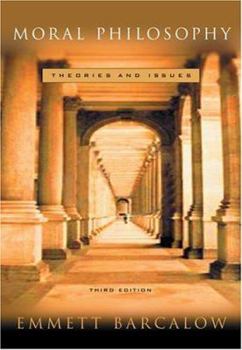Moral Philosophy: Theories and Issues
This core text in ethics devotes the first half to moral theory and the second half to contemporary moral issues. Designed for the beginning student with no background in philosophy, it is an... This description may be from another edition of this product.
Format:Paperback
Language:English
ISBN:0534526489
ISBN13:9780534526481
Release Date:April 2002
Publisher:Wadsworth Publishing Company
Length:356 Pages
Weight:1.15 lbs.
Dimensions:0.6" x 6.6" x 9.3"
Customer Reviews
1 rating
Very good choice for a textbook
Published by Thriftbooks.com User , 19 years ago
Students new to Philosophy and to Ethics could use a good model for reasoning. In an age in which the idea of "debate" has devolved into split-screen, partisan spin-wrangling, new scholars can be at a disadvantage. Perhaps the main advantage of Moral Philosophy, then, is that Emmett Barcalow provides quite a good model of philosophical reasoning. In most chapters, Barcalow takes students on a logical walk through the issues. Though Barcalow's own inclinations are discernable, the goal of the textbook is clearly to get students accustomed to asking themselves the question: "What if I thought about this from another angle?" The tendency to ask such questions is a philosophical skill, and finding a textbook that can get that skill downloaded into students' minds is rare. One of the ways Barcalow accomplishes this task, is to diligently ask students to consider each issue through the lens of moral theories they learn about at the beginning of the book. Any given moral issue chapter finds Barcalow laying out some of the major questions and concepts important for understanding why the issue is controversial. Closer to the end of the chapter, the author then asks what particular moral theories might say about the issue. Barcalow does not always hit the mark when applying theory to issue. However, the consistent use of this approach in the chapters provides an excellent teaching tool and serves as a platform for discussion. Partially reflecting the technique used in the chapters is the overall structure of the book. The first seven chapters lay out a landscape of ethical theories and considerations. Utilitarianism, Religion, and Egoism, for example, each receive their own chapters. The second half of the book is devoted to moral issues to which the theories apply, for example, feminism, crime and punishment, racism, and war. In the theoretical chapters, Barcalow does an excellent job of both introducing the perspectives and ideas that motivate the theories; but he also takes them to task. Once again, he exemplifies the approach of thinking critically while developing understanding. There are, however, two awkward aspects about the way Barcalow incorporates theory into the book. First, in the issue chapters, Barcalow usually only applies three of the moral theories discussed in the first half of the book: Utilitarian, Kantian, and Virtue Ethics. Clearly, these theories are some of the most talked about in contemporary ethics, but they are not the only ones. In fact, Barcalow's choice not to include the Libertarian, autonomy-based outlook as one of the main contenders smacks of omission. Further, in a pedagogical sense, students may get the impression that "all that theory stuff" discussed at the beginning is not relevant to sorting through moral issues, since not much of it plays a part later in the book. Since they are left out of other chapters, lessons supposedly learned early on in a semester (like what is wrong with relativism) can sometimes





